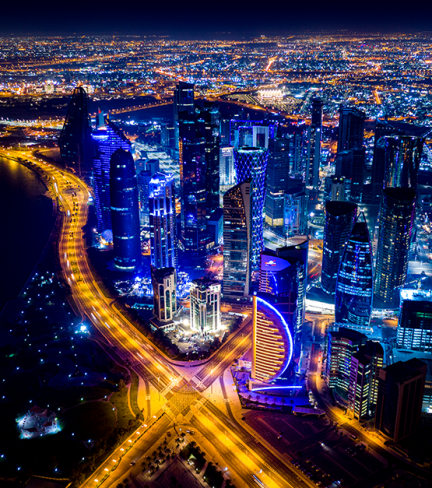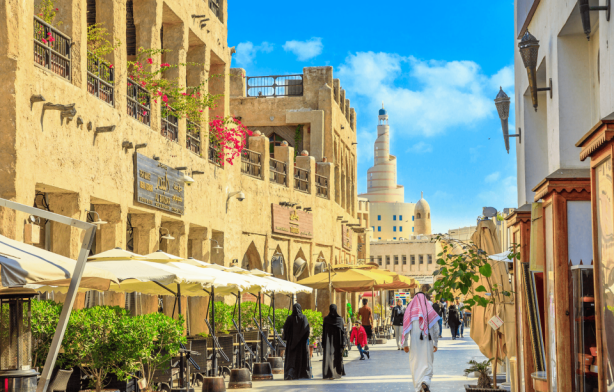Environment and Sustainability
Protecting the environment and supporting sustainable development are at the forefront of Qatar’s priorities. As one of the first countries to ratify the United Nations Framework Convention on Climate Change (UNFCCC) in 1996, Qatar has a long-standing commitment to addressing global environmental challenges.
The State of #Qatar’s Sustainability Week highlights the country’s efforts to introduce sustainability into all aspects of life as a cornerstone of #QNV2030. These efforts can be seen in pioneering projects and initiatives such as Msheireb Downtown Doha and Lusail City.#QSW2021 pic.twitter.com/vcnCHtcpVu
— مكتب الاتصال الحكومي (@GCOQatar) October 28, 2021
International cooperation for a greener future
Qatar was among the first signatories of the 2015 Paris Climate Agreement and has spared no effort to ensure the success of the negotiations that resulted in the treaty.
During the Climate Action Summit in September 2019, His Highness Sheikh Tamim bin Hamad Al Thani, announced the State of Qatar’s contribution of $100 million to support small island developing states and least developed countries to address climate change and environmental challenges.
FAO Conference
HE Dr Abdullah bin Abdulaziz bin Turki Al Subaie, former Minister of Municipality, was elected Vice-Chairperson of the 43rd Food and Agriculture Organization (FAO) Conference, which was hosted in Rome under the theme ‘Better Production, Better Nutrition, Better Environment and Better Life.’
HE discussed opportunities for cooperation between the State of Qatar and the FAO. The conference addressed numerous key issues, including the role of trade in securing diverse foods to ensure global food security during times of crisis, climate change and food prices, as well as the humanitarian crises in Yemen, Sudan, Afghanistan, Syria and other countries. Additionally, it focused on promoting and developing technological and digital innovations in the agricultural sector.

The establishment of the Ministry of Environment and Climate Change (MECC) was in accordance with the decree issued by His Highness Sheikh Tamim Bin Hamad Al Thani, the Amir of the State of Qatar, under law No. 57 of 2021. The ministry’s primary mission is to safeguard environmental quality and preserve its resources for both current and future generations, achieved through an efficient regulatory framework.
The MECC focuses primarily on addressing issues of environmental concern, ensuring the adoption of sustainable and climate-friendly practices in all sectors, and supervising the optimal implementation of the Qatar National Environment and Climate Change Strategy.
In September 2021, Qatar’s Council of Ministers approved the National Climate Change Plan, a strategic framework reflecting Qatar’s long-term sustainability ambitions and the urgent need to respond effectively to the climate crisis.
An integral part of the Qatar National Vision 2030 and in line with the UN Sustainable Development Goals (SDGs), the plan sets out Qatar’s commitment to tackle climate change by diversifying the economy, building capabilities, and optimising the use of natural resources.
The Qatar National Environment and Climate Change Strategy also constitutes a fundamental public policies pillar for preserving the environment for the benefit of current and future generations.

Research plays a crucial role in assessing potential environmental risks and identifying solutions.
The Government of Qatar provides full support to emerging companies and research hubs that ensure constant innovation and development in areas of environmental preservation, sustainability and technology.
The Qatar Science and Technology Park (QSTP) is a leading hub of applied research, technology innovation, incubation and entrepreneurship. Several of its projects aim to deliver cleaner burning and more efficient fuels, while identifying new ways of producing energy. Established by the Qatar Foundation for Education, Science and Community Development, the Earthna Center focuses on achieving sustainable development and supporting Qatar’s local and global aspirations.
The Qatar Environment and Energy Research Institute (QEERI) conducts and coordinates long-term and multidisciplinary research that addresses critical national priorities related to water security, energy and environment.
Qatar is home to Lusail City and Msheireb Downtown, both smart and sustainable cities, that were designed to combine planet friendly technology with optimised urban planning.
Strategically located in the heart of #Doha, #MsheirebDowntownDoha is the world’s first sustainable downtown regeneration project, featuring a modern lifestyle that adopts sustainable practices and environmental preservation.@MsheirebDoha pic.twitter.com/hEi5tuFuG3
— مكتب الاتصال الحكومي (@GCOQatar) November 10, 2023
Most notably, Msheireb Downtown is the world’s first sustainable downtown regeneration project.
Lusail City is equipped with a state-of-the-art District Cooling System, which is among the most advanced modern air conditioning systems.
Qatar has made significant investments in green public transportation and infrastructure projects to provide an integrated, world-class, multimodal transportation system that offers safe, reliable and eco-friendly transport services.
The Doha Metro is the backbone of Qatar’s vision for an integrated public transport system and aims to revolutionise the way people move around Doha.
Hamad Port provides the State with a modern, resilient sea-freight connection hub that is guided by internationally accepted sustainability criteria, ensuring that materials selection, water consumption and energy use are aligned to minimise its carbon footprint.
Qatar Airways is committed to working with the aviation industry towards realising environmental goals and is certified under the IATA’s Environmental Assessment programme which provides a framework for delivering continual improvement of environmental performance across business functions.
Qatar is a leading exporter of one of the cleanest fuels in the world, helping countries meet their energy needs while reducing carbon emissions from coal.
Qatar Energy launched a new Sustainability Strategy in January 2021 that establishes a number of targets in alignment with the goals of the Paris Agreement and sets in motion a plan to reduce greenhouse gas emissions by 25% by 2030.
Qatar also launched Umm Al Houl Power Plant, one of the region’s largest water desalination and energy production plants, which will contribute to reducing pollution and protecting the environment.
In 2022, Al Kharsaah solar power plant was inaugurated. It’s area is more than 10 square kilometres and includes more than 1,800,000 solar panels.
Al Kharsaah solar power plant will provide about 10% of the country’s electrical energy needs at peak times. It contributes effectively to meeting local energy demand as well as to achieving Qatar’s strategic goals for sustainable energy, which include the production of clean energy and a responsible transition to a low-carbon energy supply mix.
Qatar’s commitment to sustainability is evident in its preparation for the FIFA World Cup Qatar 2022™, where sustainability was integrated into the tournament’s design and delivery, focusing on key areas like infrastructure, environment, social development, and entrepreneurship. Learn more about Qatar’s efforts to ensure a lasting legacy here.

Qatar hosted the Expo 2023 Doha, an international horticultural exhibition, which was launched in early October 2023 and lasted until 28th of March 2024. It is the first A1 expo to be organised in Qatar and the MENA region.
Expo 2023 Doha aims to highlight four themes: modern agriculture, technology and innovation, environmental awareness, and sustainability. Qatar had participated in the 43rd session of the FAO Conference in Rome, Italy, where the State and FAO discussed ways of cooperation during Expo 2023 Doha.
As part of its long-term strategy to drive economic diversification and digital transformation, Qatar hosted the third edition of Smart City Expo Doha 2023. This intersection of technology and sustainability was the highlight on the agenda of Expo 2023 Doha, as it explored the pivotal role that data, communications and technology play in sustainable urban development and in boosting Doha’s presence in the smart cities domain on the global stage.
The event attracted more than 80 speakers and experts in the fields of digital transformation and smart cities, who explored ideas and solutions to create a better and more sustainable future for cities and their residents. Organised by the Ministry of Communications and Information Technology (MCIT) in partnership with the TASMU Smart Qatar program, the event was attended by representatives of 60 countries and featured 60 exhibitors and sponsors.
In 2019, MCIT also organised a conference under the theme ‘Safe, Smart Cities’. The event served as a one-stop destination for participants to showcase smart technology solutions as well as exchange cutting-edge expertise and ideas.




